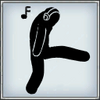- Portals
- The Current Year
- ED in the News
- Admins
- Help ED Rebuild
- Archive
- ED Bookmarklet
- Donate Bitcoin
Contact an admin on Discord or EDF if you want an account. Also fuck bots.
Backmasking
Backmasking is a technique artists use to add hidden messages to their music which can be discovered by listening to music backwards. This is rumored to be the only real way of finding messages from Satan himself and the Colonel's secret recipe of 11 herbs and spices. Perhaps this is the only good way of listening to modern music.
—Raymond Belknap, claiming he was reprogrammed after listening to Judas Priest | ||
Notable examples
The practice was popularized by the Beatles in their 1966 album Revolver. After listening to one of their songs backwards, if someone isn't praising Satan (e.g. non-Jew), there is something morally wrong with them.
Since then other artists such as Pink Floyd have done this for the lulz, Queen, Iron Maiden and Judas Priest also tried but failed. Queen's attempt was nothing more than a simple message about smoking weed.
—The Beatles | ||
Previous Quote | Next Quote
YouTube
|
See also
External Links
- wikipedia:List_of_backmasked_messages
- Various songs backmasked
- ConspiracyCarols - OfficeMax stealing the meme for their PR campaign. (DEAD)
- ConspiracyCarols for Argent009 - "Argent009 did WTC"

|
Backmasking is part of a series on Visit the Music Portal for complete coverage. |

|
Backmasking is part of a series on Visit the Truth Portal for complete coverage. |
| Backmasking is part of a series on Language & Communication | |
|---|---|
Languages and Dialects • Grammar, Punctuation, Spelling, Style, and Usage • Rhetorical Strategies • Poetry •
The Politics of Language and Communication • Media • Visual Rhetoric
Click topics to expand |

|